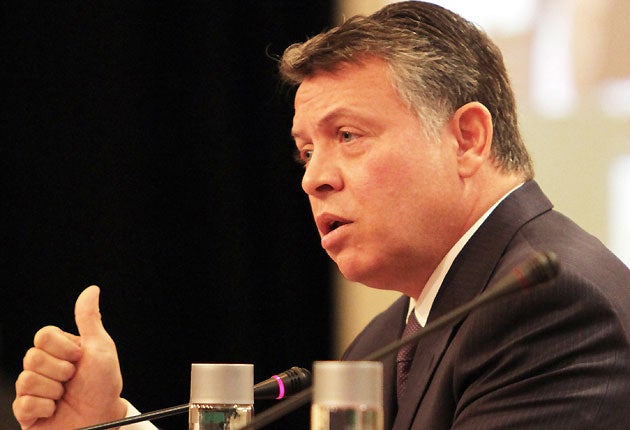Cairo's shockwaves felt in Amman as king sacks government

In a sign of further shockwaves reverberating across the Arab world, King Abdullah II of Jordan sacked his government in a surprise move after three weeks of street protests calling for economic and political reform.
The king dismissed Samir Rifai, the unpopular prime minister, after just over a year in the post, appointing the ex-premier and former army general Marouf Bakhit, whom many Jordanians see as a conservative hardliner with little appetite for reform.
The move was unexpected, not least because street protests in Jordan have remained manageable and largely peaceful, with protesters refraining from openly challenging the king. But Arab leaders have been badly rattled by the mass protests in the region.
The move is being seen as an attempt to head off further trouble from angry Jordanians, in the wake of the more violent unrest in Tunisia and Egypt.
King Abdullah's decision to dissolve the government goes part of the way to meeting political demands of the opposition, which had called for the resignation of the cabinet, the right to elect the prime minister and an end to political appointments by the king. But it is unclear if it will be enough.
The palace said the new premier would be charged with carrying out "true political reforms, enhance Jordan's democratic drive and ensure safe and decent living for all Jordanians." But the claim was greeted with scepticism by opposition figures, who said the appointment did not signal genuine change. "This is not a step in the right direction and does not show any intent towards real political reforms or meeting the popular demands for people yearning for greater political freedoms," said Hamza Mansour, head of Jordan's Islamic Action Front (IAF), the political wing of the Muslim Brotherhood.
King Abdullah, a key ally of the US in the Middle East, had promised reform in the face of protests that provided the most serious challenge to his decade-long reign. Protesters had called for the resignation of Mr Rifai, a member of Jordan's wealthy business elite, amid grinding economic difficulties caused by high unemployment, soaring inflation and rampant corruption.
Jordan has raised food and fuel subsidies and civil servants' wages, but the measures have done little to mollify protesters. The palace confirmed the king had accepted Mr Rifai's resignation. While Mr Bakhit's appointment could bolster the king's position, analysts say the new premier has no track record of reform.
He was made premier to restore calm after the 2005 bombings in Amman that left 60 dead and is unpopular with the opposition for presiding over elections in 2007, seen as rigged.
"He carried out the worst parliamentary elections in Jordan in 2007," said Zaki Bani Rsheid, a leading member of the Islamic Action Front (IAF). "He is not the right person to run things at this current state and get Jordan out of crisis," he added.
"With the choice of Bakhit, it's obvious that reforms have not started yet. We are against Bakhit because our experience with him is not encouraging," added the leader of the IAF, Hamzah Mansur also said. "There is no reason to stop the protests now."
Before being installed as prime minister in 2005, Mr Bakhit served as the kingdom's national-security adviser and its ambassador to Israel.
He was also the head of a state committee that oversaw the implementation of the peace treaty that Jordan signed with Israel in 1994, and served as Jordan's ambassador to Turkey for three years.
He has a doctorate in political science and taught the subject at a university for army and police recruits in southern Jordan.
The IAF has said repeatedly it is not seeking to oust King Abdullah, who has the power to appoint governments, approve legislation and dissolve parliament.
Jordan has a high unemployment rate among its population of six million, the majority of whom are under 25, and is suffering from the rising food and fuel prices which have affected many of its neighbours.
Subscribe to Independent Premium to bookmark this article
Want to bookmark your favourite articles and stories to read or reference later? Start your Independent Premium subscription today.

Join our commenting forum
Join thought-provoking conversations, follow other Independent readers and see their replies